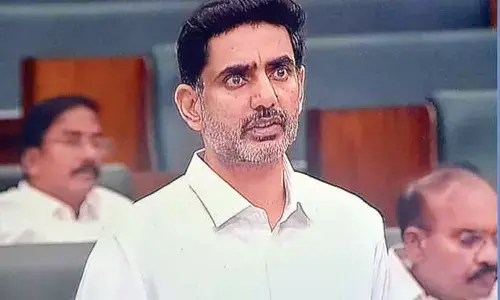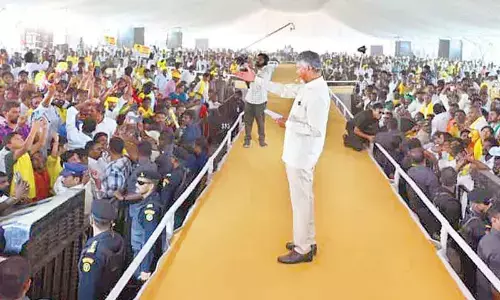Modi wins over America

Prime Minister Narendra Modi’s visit to the US was, in more ways than one, was a success. He may not have brought with him anything tangible from America but has created a climate of confidence and won back Washington which always looked at India with suspicion.
Prime Minister Narendra Modi’s visit to the US was, in more ways than one, was a success. He may not have brought with him anything tangible from America but has created a climate of confidence and won back Washington which always looked at India with suspicion. Here is a person, who was denied a US visa, who was able to shame the US Administration with speeches of friendship with America.
Modi was able to formulate a joint statement with President Barrack Obama that goes farther than what his predecessors were able to achieve. For the first time, an Indian Prime Minister wrote a joint edit with the US President in an American newspaper. This is a healthy practice which the Indian media should follow.

However, in the process, Modi has buried Jawaharlal Nehru’s idea of non-alignment deep. True, the movement has lost its raison d’être, the confrontation between the Communists and the democratic bloc. After the collapse of the Soviet Union in 1990, the Communists lost the cold war.
Still the movement had come to represent an idea that small nations should not fear the big ones because of their size or power. In comparison, the number of states comprising the third world countries was far more than those either in the American bloc or the Soviet.
Modi is a product of the capitalist world. He has neither the pull of the Nehru era of socialism, nor that of Mahatma Gandhi’s self-sufficiency. Modi wants the country to develop, whatever be the means and how big the economy may create a distance between the haves and the have-nots.
I, belonging to an era where the independence meant economic betterment of the lower half, do not understand or appreciate how a country which is poor can develop or give justice to the have-nots without moving towards left. I believe that the socialistic pattern of society which we chose was the right path and we should go back to it. But Modi’s good-worded speeches, which meant everything to everybody, may be pleasing to the ear. He is, indeed, a forceful speaker. But what do we do on ground is important.
Take for example, the Planning Commission. That it had become a parallel government is true. But we should have removed the bureaucratic conflicts. The planning for a country like ours has to be there to marshal the resources and distribute them equitably among the states. The Planning Commission needed to be put back on the track, not to pushed aside, as Modi has done.
It is a pity that the left in the country has not grown in influence. But this is because the communists do not understand the Indians. Marx is important. So is Gandhi. Yet, in the Communists’ politburo, you can see the photos of Marx and Engels, not that of Gandhi or Nehru who represented our independence struggle and sacrifices. Modi could have utilised the Planning Commission for the capitalist system which he preaches and follows. But its abolition does not make sense.
Many in the country praise Modi for not mentioning Kashmir when Pakistan Prime Minister Nawaz Sharif had devoted 19 sentences, to quote a Pakistani, to Kashmir, never done before. Modi did not even mention Kashmir in his speech. This has gone down well in the country. But by ignoring a problem, it does not disappear. India has to discuss the problem peacefully, across the table, sooner or later because Pakistan, besieged by several difficulties, finds support in the country.
The Hurriyat, which seeks to represent Kashmir, is acquiring fundamentalism and losing its appeal in India as well as among the democratic countries in the West. The Hurriyat would have earned laurels if it had turned out Syed Ali Shah Gilani when he changed his pluralistic line and talked in parochial terms.
I agree with the reaction coming from across the border that we overacted when we cancelled the talks with Pakistan after its High Commissioner in India invited the Hurriyat leaders. Such talks have been held before even when the Hurriyat spoke about separatism. But Foreign Minister Sushma Swaraj gave a clear and categorical reply that the foreign secretary-level talks have been suspended. She also explained that the government had changed and its policy was different.
I want to recall some instances of the past for Modi and Sushma Swaraj so that some continuity is visible in the policy followed then and now. Prime Minister Nawaz Sharif summed up his talks with the late Inder Kumar Gujral years ago at Male. “Aap Kashmir de nahi sakte, our hum aap se le nahi sakte” (you cannot hand over Kashmir to us and we are in no position to take it from you). Not only that, Nawaz Sharif confronted the army and entered into a time-bound agreement with India to sort out the issue of Kashmir. It’s another matter that the army dismissed him and took over the reins of the country. He had to undergo imprisonment of several months.
Why should the same Nawaz Sharif devote 19 sentences to Kashmir, the largest reference any Pakistan leader has made at the UN? Apparently, he has developed a vested interest in the Prime Minister’s chair that he occupies. The armed forces, inherent by anti-India sentiment, do not want a settlement with New Delhi because the dispute is the raison d’être of its power in Pakistan.
Nawaz Sharif, elected with the support of the military and the rightists, remained tethered to secularism. He wanted to prove that Islam was not opposed to democracy or secularism which was equivalent to pluralism. Why has he changed? Or why he begs seeing which side is buttered. He never compromised. I personally think the wilderness has taught him a lesson.
In the US, Modi was able to create an environment where the BJP has begun to count. His priority for the SAARC countries has also delineated the agenda for the government. It’s good that he has dropped hostility towards Pakistan. Now, it is time for the two countries to pick up the threads from where Manmohan Singh had left off.











